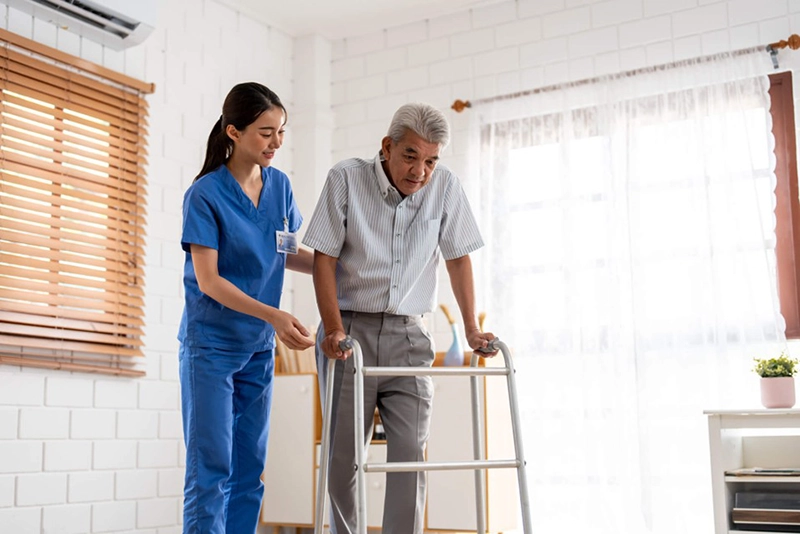Assistance with Activities of Daily Living (ADLs) for Seniors in DC
Caring for an older loved one raises many questions about safety, independence, and dignity. At the heart of this are essential self-care tasks called activities of daily living (ADLs). These are the everyday things that allow adults to maintain a routine and keep up their personal hygiene. If the goal is for your aging family member to continue living at home instead of moving to a care facility, ADL support for seniors can make all the difference. Find out exactly what ADLs entail, why they’re a vital senior homecare solution in Washington, DC, and how to get the right support for your aging loved one.
What Are ADLs, and Why Do They Matter?
ADLs are basic, necessary tasks for self-sufficiency and daily functioning. Most of us do them without thinking twice, but aging, illness, or chronic pain can make these simple acts a lot more complicated. When seniors receive help tailored to their specific ADL needs, they can maintain a safe, comfortable living environment and greater independence.
Professionals divide ADLs into these five categories:
- Eating describes the ability to transfer food from a plate or bowl to the mouth without assistance. Many seniors struggle with hand tremors or coordination issues, making eating a challenge that requires adaptive utensils or a caregiver’s support.
- Personal hygiene includes bathing, brushing teeth, and general grooming. A caregiver’s assistance with this ADL ensures personal hygiene, prevents skin infections, and boosts the senior’s self-confidence.
- Dressing encompasses picking out clothes, handling zippers or buttons, and dressing appropriately for the weather. Caregivers can support those with declining fine motor skills to maintain comfort.
- Mobility, also known as ambulating or transferring, is the ability to move around independently or with minimal assistance from a mobility device. Mobility support may include help getting out of bed, standing from a seated position, going up and down stairs, or transferring from a wheelchair to a bed.
- Toileting involves getting to and from the bathroom, removing the necessary clothing, and attending to hygiene after using the toilet. Similarly, continence is the ability to manage bladder and bowel control. For families, this is typically the most challenging ADL to manage. Having a trained caregiver to provide toileting and continence support reduces stress and discomfort.
What are IADLs?
ADLs aren’t the only tasks that matter—instrumental activities of daily living (IADLs) are also essential. IADLs are more complex tasks required to manage a household and promote personal well-being. They include the following:
- Grocery shopping and meal prep are crucial for proper nutrition but can become challenging with age. IADL support ensures seniors have access to healthy meals without the physical demands.
- Housekeeping isn’t just about appearances. A clean house helps prevent falls, manages clutter, and ensures a sanitary living space.
- Medication management is important for seniors taking multiple medications with specific dosages and schedules. Assistance in this area reduces medication errors, missed doses, and adverse health effects.
- Financial management includes handling bills, budgeting, and organizing finances. Seniors with memory difficulties or declining cognitive function may need help managing their money to prevent scams, missed bills, and other financial challenges.
- Transportation involves getting to appointments, social events, or errands. Caregivers can offer rides or help seniors navigate public transit, keeping them mobile without the risks of independent driving.
- Communication is vital to connect seniors with their family, friends, doctors, and others. Caregiver support may include setting up phone or video calls, assisting with hearing aids, and helping with emails or letter writing.
How Are ADLs and IADLs Assessed?
An ADL assessment is a simple evaluation conducted by a registered nurse or licensed caregiver to determine which daily living tasks a senior can or cannot perform independently. This assessment involves observing mobility, asking about eating habits, assessing personal hygiene practices, and checking medication adherence, among other things.
Assessing ADLs and IADLs can also determine eligibility for certain health insurance or Medicaid programs. An accurate evaluation helps families understand what care is essential and whether independent living is still feasible with some assistance. Rest assured that caregivers can combine ADL and IADL support into one seamless service. When provided in a home setting, the extra help fosters independence for seniors and peace of mind for their families.
The Benefits of Personalized ADL Services for Seniors
Here are some core advantages of hiring a professional for activities of daily living assistance:
- Safety: By helping with tasks like bathing, dressing, and mobility, caregivers reduce the risk of falls, a leading cause of injury and hospitalization for older adults.
- Physical health: Consistent personal hygiene, nutritional support, and medication management help seniors avoid infections, malnutrition, and other health issues.
- Mental well-being and companionship: ADL support provides an opportunity for social interaction, which reduces loneliness and depression among seniors who live alone.
- Respite: When family members take on the caregiver role, it can become a demanding, full-time job. ADL assistance lets them take a break, reducing stress and promoting a healthier relationship with their aging loved one.
In-Home Care for Elderly ADLs from SmithLife Homecare
If you’re seeking quality daily living help for your senior loved one, consider partnering with SmithLife Homecare. We cater to each client’s needs with flexible services that can start, change, or stop within 24 hours. Our highly trained team comprises over 400 caregivers capable of providing compassionate, reliable support for all ADL needs, whether that involves grocery shopping assistance once a week or round-the-clock live-in care from a certified nurse.
In addition to providing outstanding elderly care daily living support, SmithLife Homecare offers free registered nurse assessments to ensure your loved one gets the exact level of care they need. We also partner with Charles E. Smith Life Communities (CESLC) to deliver the highest quality care with value-based pricing. Plus, we’re a proud recipient of the 2025 Washington Jewish Week Readers’ Choice Award for Best in Home Care. If you’re ready to arrange homecare assistance for ADLs in Rockville, Washington, DC, or the Montgomery County area, please contact us today.

About the Author-
Le’Aira Gonzalez, the Agency Director of SmithLife Homecare, has dedicated over 21 years to serving seniors, underscored by her comprehensive background in Psychology, Human Resources, Public Health, Community Outreach Research, and Project Management. A Certified Dementia Practitioner and licensed Assisted Living Manager, she has risen from caregiver to director, displaying profound compassion and leadership that promotes inclusivity and top-tier care. Beyond her professional achievements, Le’Aira is a fervent advocate for eldercare, committed to raising awareness and impacting lives through community outreach.
